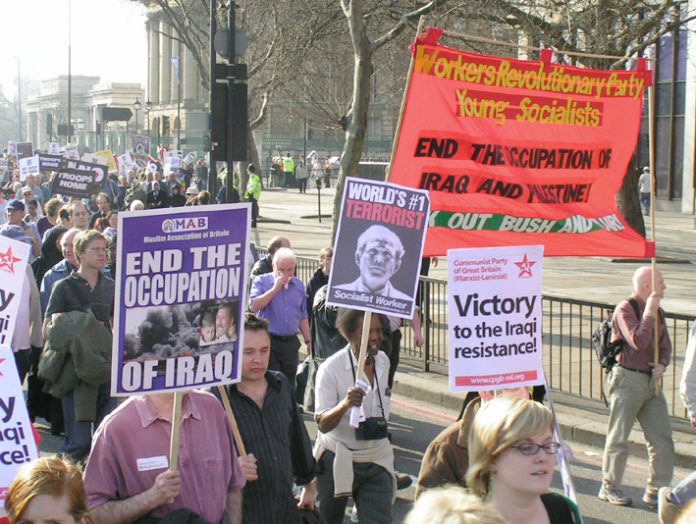Former Attorney General Lord Goldsmith yesterday told the Iraq Inquiry, that he was not pressured into discarding his opposition to going to war without a second Security Council resolution.
He said that he was unconcerned that the government would have fallen if he had not changes his line, or that the tens of thousands of troops would have had to be withdrawn, breaking the alliance with the US.
He claimed his main concern was the Chief of Defence Staff and the Treasury would face legal action if the war was illegal.
He was asked about what made him change his legal advice between 7th March and 17th March 2003.
Goldsmith said that following 7th March: ‘I had two conversations. First of all I was presented with a letter from the MoD which reflected the views of the CDS (Chief of Defence Staff) calling for clear direction, and Juliet Welch, Treasury Solicitor.
‘Both were saying they are potentially at risk personally, “if we participate we could face prosecution”.
‘They were people taking risks, I believed it was a reasonable request, so I had to clearly give a decision, yes or no.
‘It was not enough to say we had a reasonable case.’
He went on to deny prime minister Blair had asked him for ‘a definite position’.
Goldsmith said: ‘I don’t recall it in that way.’
He also denied a newspaper report that he was pinned to the wall in Downing Street by Lord Faulkner and Baroness Sally Morgan in a bid to get him to change his advice.
Earlier, he said that he altered his advice in February 2003 on the need for a second UN resolution, after a series of meetings with American legal advisors, including US national security adviser Condoleezza Rice and Will Taft IV, a senior State Department legal official.
Goldsmith said their description of the negotiations that led to the Security Council resolution helped convince him that a second resolution was not required.
He said the Americans had all been clear that President Bush’s one ‘red line’ in the negotiations on 1441 was that they should not ‘concede a veto’ to the French.
During the morning session, Goldsmith told the inquiry that he had believed a second UN resolution would have been ‘safer’ to justify military action, but he eventually concluded that a further reinforcement to the earlier resolution 1441 was not necessary.
Goldsmith told the inquiry that he changed his mind ‘for good reasons’.
He revealed the fragility of his position while giving evidence.
He said: ‘Following discussions with Jeremy Greenstock, following my investigation of UNSC history, I was of the view that a reasonable case could be made – I’m sorry, there was a reasonable case that a second resolution was not necessary, and that, that was on past precedents sufficient to constitute a green light.’
He said his previous advice had been preliminary.
He claimed that Blair had told him at a meeting shortly before the war: ‘ “I do understand that your advice is your advice.” He accepted it was for me to reach a judgment and he had to accept that.’
Earlier, Goldsmith criticised the government’s decision not to declassify more secret legal documents relating to the Iraq war.
He told the Inquiry: ‘I want to make it clear that I didn’t agree with the decision that has apparently been made that certain documents are not to be declassified but I will give the evidence that the inquiry seeks.’
Inquiry chairman Sir John Chilcot said he was ‘frustrated’ that more documents had not been made public.
The key missing documents include Goldsmith’s draft legal advice on January 14, 2003, in which he said the war would be illegal and a second dossier on March 7 in which he is reported to have concluded that it would be lawful.
Goldsmith told the inquiry he had three meetings with the government’s intelligence coordinator, Sir John Scarlett, chairman of the Joint Intelligence Committee, before ruling that it would be lawful to invade Iraq.
Goldsmith told the Inquiry that following the meetings with Scarlett he did not believe that Saddam would use chemical and biological weapons to launch an attack on British forces.
He said: ‘My judgement was there wasn’t evidence of imminence of threat which could justify us saying self-defence is a basis for force.’
He maintained that the reason for war was non-compliance with UN resolutions.
